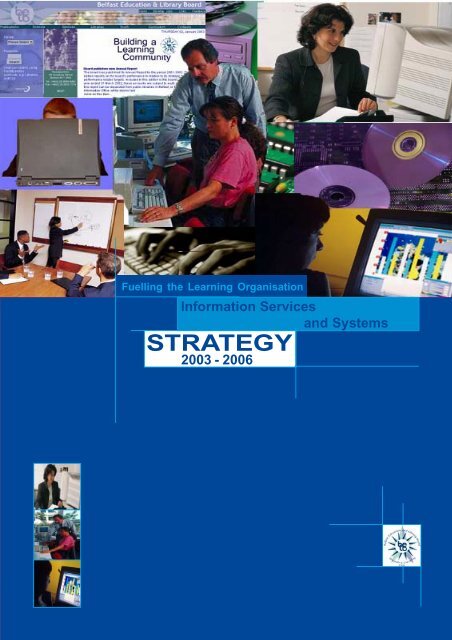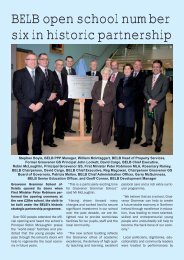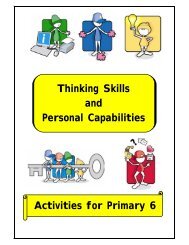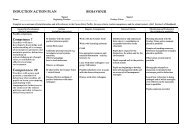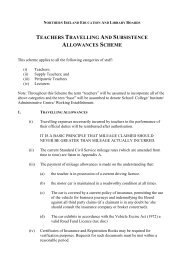ISSstrategy doc - Belfast Education & Library Board
ISSstrategy doc - Belfast Education & Library Board
ISSstrategy doc - Belfast Education & Library Board
- No tags were found...
You also want an ePaper? Increase the reach of your titles
YUMPU automatically turns print PDFs into web optimized ePapers that Google loves.
Fuelling the Learning OrganisationInformation Servicesand SystemsSTRATEGY2003 - 20061
“ The board’s information strategy willsupport the delivery of education, youthand library services by meeting the diverseand changing information needs of theboard as a learning organisation and of<strong>Belfast</strong> as a learning city in a timely andeffective way.”Acknowledgements;The graphics in this <strong>doc</strong>ument have been selected fromMicrosoft Design Gallery and Corell Clipart Gallerytwo2
Information Servicesand Systems Strategy“Building a learning community”INTRODUCTIONThe <strong>Belfast</strong> <strong>Education</strong> and <strong>Library</strong> <strong>Board</strong> exists to meet the education, youthand library needs of a wide range of users across the city. Accurate,comprehensive and timely information is an essential fuel driving theprovision of effective services. Information influences policies, services,consultation processes, decisions, procedures and developments and mustmeet the needs of the general public, the users of services, boardmembers, partner organisations, government departments and boardofficers. The availability of such information is dependent on publications,<strong>doc</strong>uments, records and ephemeral communications that are clearlyexpressed and presented and efficiently organised, and on robust, integratedand up-to-date information and communications systems that make themaccessible in the most suitable format for the user.In 1999, the board produced an Information Systems Strategy to steer thedevelopment of provision in this area with the following aim:“To enable the board to provide education and library services extendingbeyond traditional boundaries through the maximum use of informationtechnology and in an open system environment which will allow the board tobe flexible in meeting future changes”three3
The ensuing three years have seen significant progress, both in relation toNI Strategic Systems: Accruals Accounting, Estates Management,Classroom 2000 and Electronic Libraries; and board developments:enhanced connectivity, greater access to and use of email and the Internet,development of the new board website. Other external developments suchas changes to data protection legislation, the introduction of Freedom ofInformation and the emerging e-government agenda make a review of thestrategy timely. These developments also reinforce the case forbroadening the strategy from its focus on information systems tocomprehend the wider issues of information services and content.Information systems and information services are inextricably intertwined;information services and content cannot be exploited effectively withoutcoherent, interoperable and integrated systems – networks, hardwareplatforms, software and applications. However, it is essential to bear in mindthat the systems are no more than enablers and that the success of theboard in the delivery of its core services depends on comprehensive,accurate and timely informationThis strategy will steer the board in the direction of these twin goals ofrobust systems and good quality, accessible information.four4
VISION STATEMENTThe board’s information strategy will support the delivery of education, youthand library services by meeting the diverse and changing information needsof the board as a learning organisation and of <strong>Belfast</strong> as a learning city in atimely and effective way.The strategy will be informed by the following principles· Accessibility· Quality· Efficiency· Integration of systems· Compliance with current and emerging legislationThe following objectives will support the board’s strategy.Customer NeedsThe board will develop services and systems to meet the needs ofcustomers in a timely and appropriate way.· Identify and assess customer and staff needs in relation to access toinformation and establish an effective and routine practice to provideconsistent, responsive and regular monitoring.· Develop integrated and accessible systems to make information availableto internal and external customers.· Review and revise current structures and arrangements for mediaproduction and ICT development and support to reflect changingneeds.· Further develop the role and effectiveness of the Public Service andInformation Point.five5
E-governmentThe board is committed to exploiting information and communicationstechnology in the conduct of its business to support e government targets.· Progress towards the e-government target of complete on lineservice by 2005.· Identify areas of work within the board where electronic methods canbe developed to improve communication with customers andpartners throughout the board’s range of services and areas ofinfluence and provide appropriate ICT facilities.· Assess the impact of the ELBs IS/E-Government strategy, availableby December 2002, and work with the other boards towards itsimplementation.Electronic Information ServicesThe further development of the board’s website and the establishment ofan intranet carrying a comprehensive range of up-to-date and archivedinternal information will enhance services to the public and to internalusers.· Put in place a structure and the necessary expertise to developand manage the board’s web services for the maximum benefit ofcustomers, partners and staff.· Develop an integrated, comprehensive management informationsystem to meet the board’s needs and ensure that it is accessibleto staff in all locations.· Further develop the use of electronic communication within theorganisation.· Improve remote access by specific staff to the board network.six6
<strong>Board</strong> Publications and Printed MaterialsWhile the need for high quality publications and printed materials willcontinue, it is essential that users have the option of viewing <strong>doc</strong>uments inelectronic format, remotely or within board facilities as appropriate. Theboard must also find optimum solutions for the management of printingand copying across the organisation.· Ensure that all board publications are available in print andelectronic formats as appropriate, meeting the needs of board staff,schools and the wider education sector, and all other stakeholders.· Ensure the timely production of board publications to anappropriate standard and in line with Best Value principles.· Introduce a print and copier management system across key boardsites to facilitate the most effective use of equipment, paper andstaff time.Document ManagementFreedom of Information legislation places an onus on the board to makeinformation readily available. While much work has been done in capturinginformation about records held, an integrated system must now bedeveloped to organise it and provide appropriate access.· Establish a central board <strong>doc</strong>ument management system thatintegrates paper and electronic resources, rationalises storagedemands, enhances access and contributes to freedom ofinformation.seven7
Resources and SkillsInformation services and systems is an area of rapid technologicaldevelopment placing ongoing pressure on resources in terms of networks,hardware and applications and staff availability and skills.· Provide for a rolling programme to refresh all ICT facilities in line withdepartmental needs.· Identify and ensure necessary financial and human resources to supportthe strategy.· Ensure that all members of staff receive ICT training to EuropeanComputer Driving Licence level.· Provide on-going training to allow staff to maintain a high level ofcompetence in using ICT facilities.· Ensure that specialist staff, have adequate training to facilitate the needsof all areas of the board.· Provide training to ensure all members of staff are aware of the fullpotential of electronic communications and expectations of the onlinemarket and e-government requirements.Policies and PracticesIn an area of dynamic development policies and practices need to beestablished and reviewed to ensure internal and external users haveup-to-date guidance on what they can expect from the board’s informationservices and systems and what is expected of them as users of the services.· Issue an interim policy on appropriate staff use of ICT facilities.Contribute to a five board policy and adopt when available.· Review and amend working practices and develop standards to meetcustomer expectations arising from developments in e-business ande-communication.· Raise awareness among internal and external customers on theservices provided by the Reprographic Unit.· Develop guidelines and procedures to reduce paper consumption by5% by March 2004.eight8
Integration of SystemsIntegration of SystemsWhile the boards individually and as a group have sought to procure systemsin a coherent way to facilitate inter-operability, constraints such as resources,externally imposed deadlines and procurement regulations have meant thatsuccess in achieving this has been limited. The proliferation of incompatiblesystems supported by different service providers is now a reality within andacross the boards. Ways need to be found to tackle this problem so that staffand management units across the boards can work more effectively and makethe most of what new technology offers.· Explore the scope for greater integration of strategic five-boardsystems and improved co-operation between existing contractors andservice providers.Implementing the StrategyThe ISS Steering Group will oversee the implementation of the strategy throughan action planning process. Members of the ISS management team will takethe lead on specific actions and will report to the Steering Group.The Steering Group will be chaired by the chief librarian and serviced by theISS manager. Membership will be made up of departmental informationchampions who will represent the views and needs of their department andcontribute to an overall corporate and integrated approach to ongoingdevelopment. The board’s information officer will be a permanent member ofthe steering group.Members of the ISS management team will attend steering group meetingsas required to report on progress and advise on issues arising.There are strong connections between the role of the ISS Steering Group andthe work of the board’s corporate services section, which has an informationrole delivered by the Public Service and Information Point, the informationofficer and the research and development officer. In order to ensure effectivecollaboration between the groups the ISS manager will be a permanentmember of the Corporate Standards Group.nine9
Information Services and Systems Overviewten10


